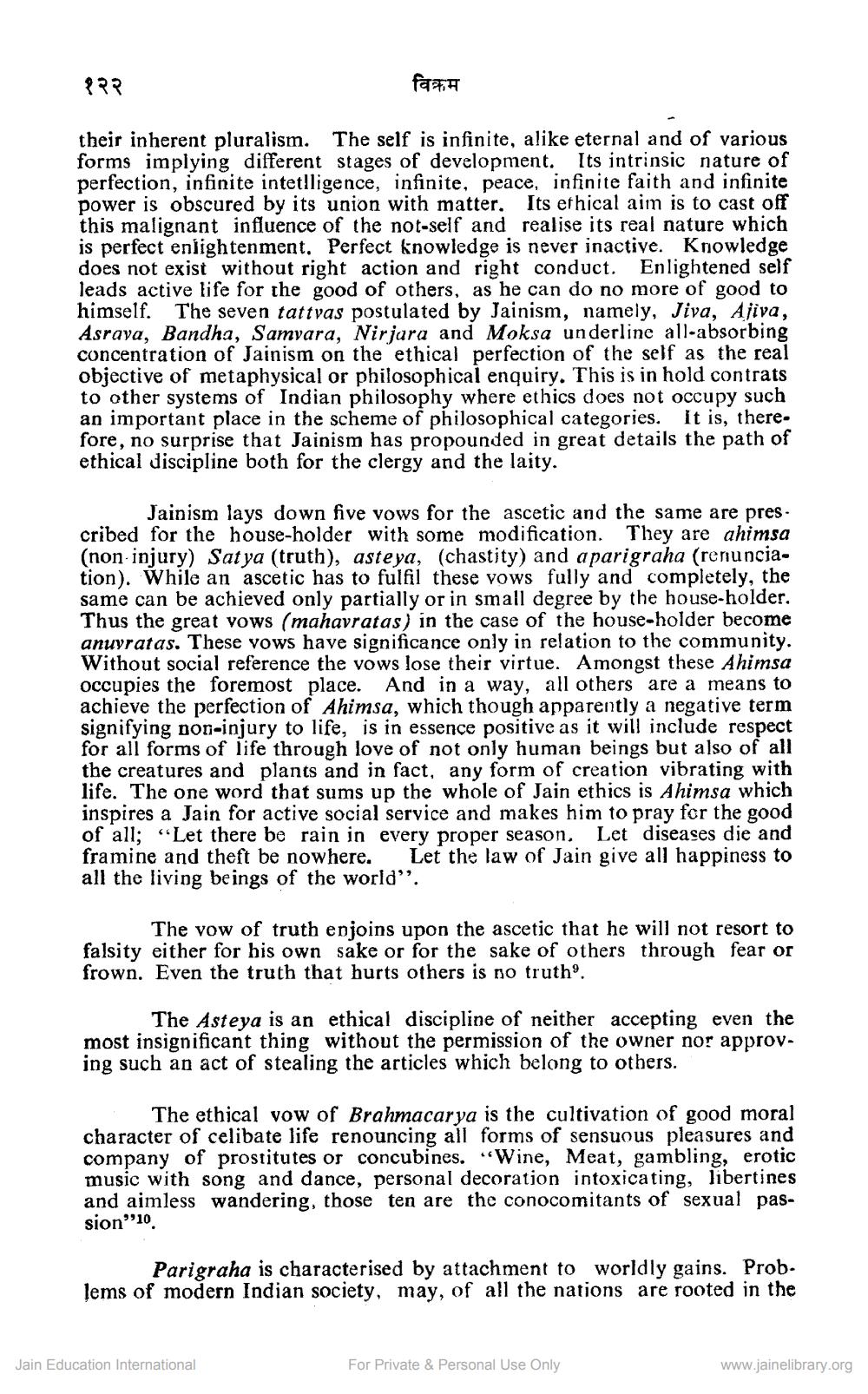________________
१२२
विक्रम
their inherent pluralism. The self is infinite, alike eternal and of various forms implying different stages of development. Its intrinsic nature of perfection, infinite intetlligence, infinite, peace, infinite faith and infinite power is obscured by its union with matter. Its ethical aim is to cast off this malignant influence of the not-self and realise its real nature which is perfect enlightenment. Perfect knowledge is never inactive. Knowledge does not exist without right action and right conduct. Enlightened self leads active life for the good of others, as he can do no more of good to himself. The seven tattvas postulated by Jainism, namely, Jiva, Ajiva, Asraya, Bandha, Samvara, Nirjara and Moksa underline all-absorbing concentration of Jainism on the ethical perfection of the self as the real objective of metaphysical or philosophical enquiry. This is in hold contrats to other systems of Indian philosophy where ethics does not occupy such an important place in the scheme of philosophical categories. It is, there. fore, no surprise that Jainism has propounded in great details the path of ethical discipline both for the clergy and the laity.
Jainism lays down five vows for the ascetic and the same are prescribed for the house-holder with some modification. They are ahimsa (non injury) Satya (truth), asteya, (chastity) and a parigraha (renunciation). While an ascetic has to fulfil these vows fully and completely, the same can be achieved only partially or in small degree by the house-holder. Thus the great vows (mahavratas) in the case of the house-holder become anuyratas. These vows have significance only in relation to the community. Without social reference the vows lose their virtue. Amongst these Ahimsa occupies the foremost place. And in a way, all others are a means to achieve the perfection of Ahimsa, which though apparently a negative term signifying non-injury to life, is in essence positive as it will include respect for all forms of life through love of not only human beings but also of all the creatures and plants and in fact, any form of creation vibrating with life. The one word that sums up the whole of Jain ethics is Ahimsa which inspires a Jain for active social service and makes him to pray for the good of all; “Let there be rain in every proper season. Let diseases die and framine and theft be nowhere. Let the law of Jain give all happiness to all the living beings of the world".
The vow of truth enjoins upon the ascetic that he will not resort to falsity either for his own sake or for the sake of others through fear or frown. Even the truth that hurts others is no truth.
The Asteya is an ethical discipline of neither accepting even the most insignificant thing without the permission of the owner nor approving such an act of stealing the articles which belong to others.
The ethical vow of Brahmacarya is the cultivation of good moral character of celibate life renouncing all forms of sensuous pleasures and company of prostitutes or concubines. Wine, Meat, gambling, erotic music with song and dance, personal decoration intoxicating, libertines and aimless wandering, those ten are the conocomitants of sexual passion"10.
Parigraha is characterised by attachment to worldly gains. Prob. lems of modern Indian society, may, of all the nations are rooted in the
Jain Education International
For Private & Personal Use Only
www.jainelibrary.org




